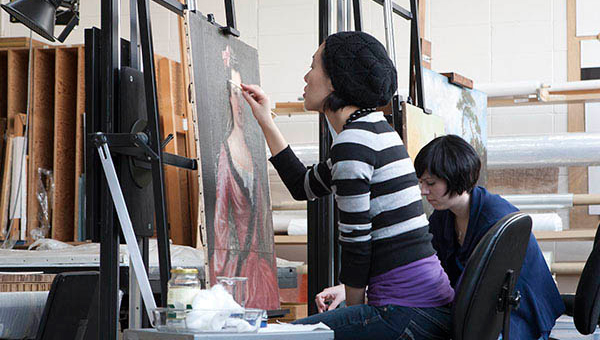
Queen’s valued tradition of offering one of the country’s best broad-based arts and science learning experiences amidst a renowned sense of spirit and community is not about to change. But how we teach our students and what we prepare them for is changing.
In an increasingly interconnected and globalized world, an interdisciplinary education, combined with new ways of learning and opportunities to understand local and global communities will equip our students with skills that are in demand among employers, professional schools, and post-graduate programs: critical thinking, communication and independent judgment.
Arts and Science Goal: $70,000,000
Highlighted Priorities
–Student Initiative and Scholarships - $10,000,000
- Scholarships and Bursaries
- Teaching Assistance Fund
- Dean's Student Initiative Fund
Queen’s students are defined by their passion, their motivation and their readiness to change the world. For many of our Arts and Science undergraduates, merit-based and needs-based financial assistance makes all the difference, enabling them to enrol at the University and participate fully in Queen’s life without financial burden. Currently, 50% of our students receive some form of financial support, although those who need or would benefit from financial assistance is much higher.
At Queen’s, undergraduates and graduate students learn and discover in a tight-knit intellectual community. More than 1,000 graduate and 200 undergraduate students work as tutorial assistants, sharing knowledge and skills, and providing an important support to thousands of students. The Arts and Science Teaching Assistance Fund will help us increase the ranks of teaching and research assistants, provide training and resources, and ensure the quality of the program.
The Arts and Science faculty balances formal and interactive educational approaches, encouraging experiential learning – going beyond the classroom to learn and discover. The Dean’s Student Initiative Fund will support one-of-a-kind opportunities close to home and around the world, such as ASUS camps, the Queen’s Canadian Leadership Conference, and the Queen’s Health Outreach program in Guyana
–Innovative Learning Environments - $45,000,000
- Queen’s University Biological Station
- Isabel Bader Centre for the Performing Arts
The student experience lies at the heart of Queen’s identity. Our young men and women learn the value of teamwork in labs, on stage, in orchestras, or through field programs. These facets of the broader learning environment at Queen’s require funds to ensure our learning spaces, equipment, technology, opportunities for speakers’ and lectures series, and field study programs remain relevant and enriching for our students. Some examples of innovative learning environments in the faculty include:
The Queen’s University Biological Station (QUBS) is one of the premier field stations in North America, the largest inland field station in Canada, and has been a pivotal part of research and teaching at Queen’s for more than 60 years. Our vision to develop this community resource is two-fold: we will purchase the Elbow Lake reserve, located close to QUBS and Kingston, as a hub facility for our expanding public outreach and education programs, and we will enhance the QUBS Endowment Fund. Adding the Elbow Lake land and facility will cement our partnership with the Nature Conservancy of Canada and allow us to broaden our program and impact. Increased income from an endowed fund will be used to help our efforts to reduce the field station’s ecological footprint, expand our program, upgrade equipment and seize opportunities as they arise.
The Isabel Bader Centre for the Performing Arts endowment funds will provide annual funds to support curriculum, programming, creative collaborations with the community, and state-of-the-art technology at Queen’s – and Kingston’s – newest performing arts centre. The Isabel Bader Centre for the Performing Arts will provide a new venue for learning, discovery and creative inspiration. The departments of Drama, Film and Media, Art History, Fine Arts and Music will meet under one roof, offering exciting new opportunities for integrated approaches to learning for students and the Kingston and regional community
–Inspiring Faculty and Teaching - $10,000,000
- Attraction and retention of Chairs and Professorships for programs in physical and natural sciences, humanities and languages, social sciences and creative arts
Psychology's new learning lab for PSYC-100
In the studies of Arts and Sciences, research and learning have a central role in making sense of the human experience. Every great university is anchored by a strong Arts and Sciences program, and the foundation of that is in the quality and initiative of its people. That’s why one of the Faculty of Arts and Science’s biggest campaign priority focuses on attracting and retaining the most inspiring teachers. We will increase the number of endowed chairs; provide enhanced support and resources to existing chairs, professorships and fellowships – all in support of brilliant minds and ensuring outstanding learning experiences for our students.
–Internationalization in Learning - $5,000,000
- Travel funds for Global Development work-studies, third-year exchanges and Queen's-Blyth international courses
- Program support in Languages, Literature and Culture
Students in Ghana on Queen's Project on
International Development (QPID)
Today’s world demands globally-minded graduates, fluent in cultures as well as conversations, and able to work anywhere in the world. We will invest in both international learning and international experience, ensuring we graduate global citizens with a deep understanding of their world.
We will develop an Arts and Science International Fund to support our students who, each year, experience the world through 165 programs in more than 40 countries. Programs also include our own Bader International Study Centre in England and our Global Development Work Study Programs. Financial assistance will allow more students to participate in these life-changing experiences and help offset travel and living expenses.
A second (or third) language is an important attribute for today’s world, where everyone from business people to artists work across borders and cultures. The Arts and Science International Fund will also support initiatives such as a language acquisition specialist, a scholar who will lead faculty workshops on second-language learning and engage in research on the best way to teach in this area.

